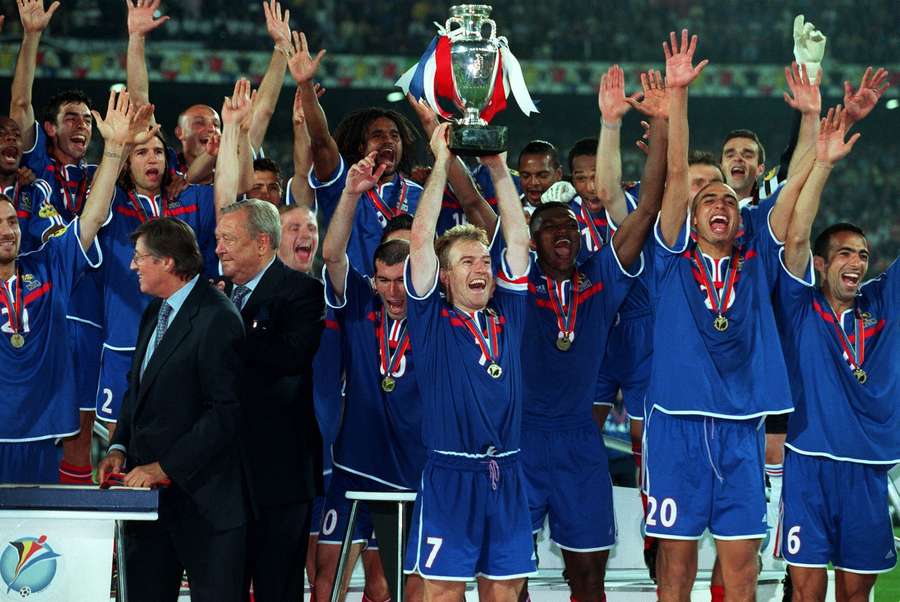For the first time in 2000, UEFA decided that the Euros would be held in two countries, Belgium and the Netherlands, with matches to be played in four stadiums in each nation.
It was the second tournament in a row to start with 16 teams, and by the end was the second time in history that a national team managed to hold both the world and European titles.
After West Germany followed up their 1972 European title with success at the 1974 World Cup on home soil, it was France's turn to repeat the feat, but in reverse order.
They won the world title on home turf in 1998, and two years later were crowned European champions.
A dramatic qualification campaign
Although reigning world champions, France had serious doubts about their place at the Euros, having qualified thanks to an 88th-minute winner.
Led by Roger Lemerre, Aime Jacquet's second-in-command at the 1998 World Cup, the French stuttered badly in their qualifying group, drawing 1-1 away to Iceland, needing a late goal to beat Russia in Moscow, drawing 0-0 home and away to Ukraine, beating only Andorra and Armenia twice, before losing 3-2 at home to Russia and then beating Iceland 3-2 at the Stade de France.
These results left Les Blues waiting for the result of the final match between Russia and Ukraine in Moscow, with a win for either team sending France through to the play-offs.
The hosts opened the scoring in the 75th minute, only for Andrey Shevchenko's free-kick with two minutes of normal time to be tipped into the net by the goalkeeper, sending France to the Euros and Ukraine to the play-offs.
A group of champions
The draw for Euro 2000 put four previous European Championship winners in Group D: France (1984), the Netherlands (1988), Denmark (1992) and the Czech Republic (as Czechoslovakia in 1976).
With a squad largely made up of players who had triumphed at the World Cup two years earlier, with Zinedine Zidane being the undisputed star of the team who would go on to be named player of the tournament, the French won their first two group matches against Denmark (3-0) and the Czech Republic (2-1), but lost 3-2 to the Netherlands in one of the most spectacular matches of the tournament.
From second place in the group, France overcame Spain 2-1 in the quarter-finals and Zidane scored the golden goal in extra time against Portugal (2-1) to send Les Bleus into the final.
The magical Zizou had endured a terrible two years after the dream final against Brazil in Paris, finishing the 1999-2000 Serie A season with Juventus with just four goals, including three from free-kicks, and one assist.
At the Euros, however, he was once again the architect who turned France into a footballing machine.
"Zidane is better now than he was two years ago," Pele said. "He has more confidence to dictate a match as well as star in it... whether he will become one of the greatest players of all time is another question. We'll have to wait and see."
Golden goal again decides a dramatic final
Italy dominated their group with Belgium, Turkey and Sweden, winning all three games. The Azzurri, with players like Francesco Totti, Alessandro Del Piero, Pippo Inzaghi, Paolo Maldini and Fabio Cannavaro, then eased past Romania in the quarter-finals 2-0 and beat the Netherlands in the semi-finals, in a match where the hero was goalkeeper Francesco Toldo, who saved a penalty in normal time and two more in the shootout - the Dutch also hit the post from the spot in normal time.
Marco Delvecchio gave the Azzurri the lead in the final after 55 minutes and it looked like Italy were on their way to their second European title.
Desperate, the French threw all their offensive weapons into the game at the end. A long ball flicked on by David Trezeguet reached Sylvain Wiltord, who fired a shot from a tight angle under Toldo -it was a clear mistake by the goalkeeper who, if Italy had held on, might have been voted the tournament's best player.
The coup de grace came in the 103rd minute, when Trezeguet scored one of the finest goals the tournament has seen.
It was the second consecutive final decided by a golden goal, after Oliver Bierhoff's win at Wembley four years earlier. Coincidentally, both scorers were reserve strikers who wore number 20.
Team of the Tournament"
For the first time in history, UEFA decided to include not just a starting XI but a full 22-player squad. As mentioned above, Zidane was named the player of the tournament.
Goalkeepers: Fabien Barthez (France), Francesco Toldo (Italy)
Full-backs: Laurent Blanc (France), Lilian Thuram (France), Marcel Desailly (France), Fabio Cannavaro (Italy), Paolo Maldini (Italy), Alessandro Nesta (Italy), Frank de Boer (Netherlands)
Midfielders: Demetrio Albertini (Italy), Patrick Vieira (France), Josep Guardiola (Spain), Rui Costa (Portugal), Edgar Davids (Netherlands), Luis Figo (Portugal), Zinedine Zidane (France)
Forwards: Thierry Henry (France), Savo Milosevic (Yugoslavia), Raul González (Spain), Patrick Kluivert (Netherlands), Nuno Gomes (Portugal), Francesco Totti (Italy)
